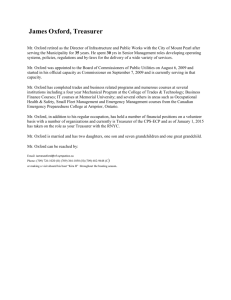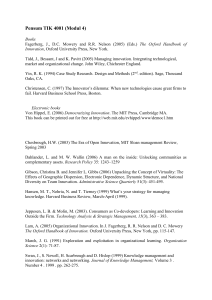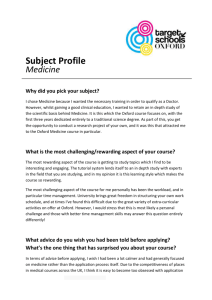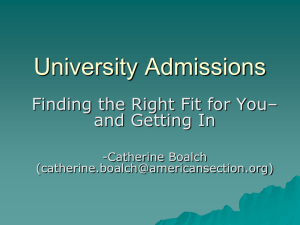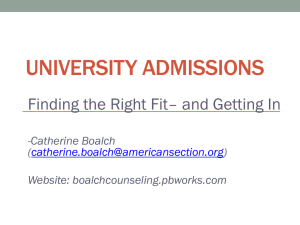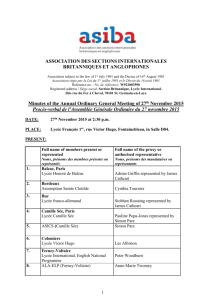American Section Alumni Survey: Wadham College, Oxford
advertisement
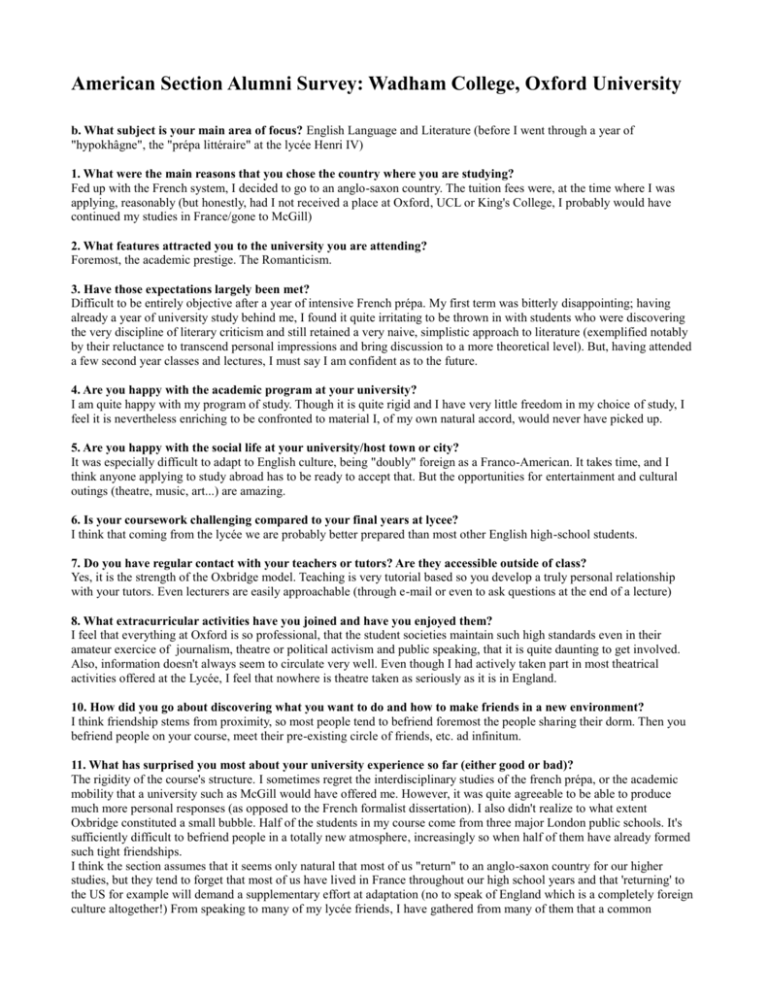
American Section Alumni Survey: Wadham College, Oxford University b. What subject is your main area of focus? English Language and Literature (before I went through a year of "hypokhâgne", the "prépa littéraire" at the lycée Henri IV) 1. What were the main reasons that you chose the country where you are studying? Fed up with the French system, I decided to go to an anglo-saxon country. The tuition fees were, at the time where I was applying, reasonably (but honestly, had I not received a place at Oxford, UCL or King's College, I probably would have continued my studies in France/gone to McGill) 2. What features attracted you to the university you are attending? Foremost, the academic prestige. The Romanticism. 3. Have those expectations largely been met? Difficult to be entirely objective after a year of intensive French prépa. My first term was bitterly disappointing; having already a year of university study behind me, I found it quite irritating to be thrown in with students who were discovering the very discipline of literary criticism and still retained a very naive, simplistic approach to literature (exemplified notably by their reluctance to transcend personal impressions and bring discussion to a more theoretical level). But, having attended a few second year classes and lectures, I must say I am confident as to the future. 4. Are you happy with the academic program at your university? I am quite happy with my program of study. Though it is quite rigid and I have very little freedom in my choice of study, I feel it is nevertheless enriching to be confronted to material I, of my own natural accord, would never have picked up. 5. Are you happy with the social life at your university/host town or city? It was especially difficult to adapt to English culture, being "doubly" foreign as a Franco-American. It takes time, and I think anyone applying to study abroad has to be ready to accept that. But the opportunities for entertainment and cultural outings (theatre, music, art...) are amazing. 6. Is your coursework challenging compared to your final years at lycee? I think that coming from the lycée we are probably better prepared than most other English high-school students. 7. Do you have regular contact with your teachers or tutors? Are they accessible outside of class? Yes, it is the strength of the Oxbridge model. Teaching is very tutorial based so you develop a truly personal relationship with your tutors. Even lecturers are easily approachable (through e-mail or even to ask questions at the end of a lecture) 8. What extracurricular activities have you joined and have you enjoyed them? I feel that everything at Oxford is so professional, that the student societies maintain such high standards even in their amateur exercice of journalism, theatre or political activism and public speaking, that it is quite daunting to get involved. Also, information doesn't always seem to circulate very well. Even though I had actively taken part in most theatrical activities offered at the Lycée, I feel that nowhere is theatre taken as seriously as it is in England. 10. How did you go about discovering what you want to do and how to make friends in a new environment? I think friendship stems from proximity, so most people tend to befriend foremost the people sharing their dorm. Then you befriend people on your course, meet their pre-existing circle of friends, etc. ad infinitum. 11. What has surprised you most about your university experience so far (either good or bad)? The rigidity of the course's structure. I sometimes regret the interdisciplinary studies of the french prépa, or the academic mobility that a university such as McGill would have offered me. However, it was quite agreeable to be able to produce much more personal responses (as opposed to the French formalist dissertation). I also didn't realize to what extent Oxbridge constituted a small bubble. Half of the students in my course come from three major London public schools. It's sufficiently difficult to befriend people in a totally new atmosphere, increasingly so when half of them have already formed such tight friendships. I think the section assumes that it seems only natural that most of us "return" to an anglo-saxon country for our higher studies, but they tend to forget that most of us have lived in France throughout our high school years and that 'returning' to the US for example will demand a supplementary effort at adaptation (no to speak of England which is a completely foreign culture altogether!) From speaking to many of my lycée friends, I have gathered from many of them that a common experience shared by all of us was our 'surprise' at the cultural differences which back home, were minimized. Had I realized this before embarking, I think the shock of the first few weeks would have been somewhat attenuated. 12. What do you wish you'd known when YOU were applying to university? a) the Oxford version of the course as opposed to the Cambridge one. (I now know that Oxford has a very conservative, traditional stance to literature, enforcing mandatory modules in Old and Middle English whereas Cambridge grants its students greater liberty, encouraging them to pursue modules in foreign literature and emphasizing 'modern' works as opposed to Oxford's very canonical stance. I have very little freedom of choice in my area of study and must follow and imposed curriculum). When applying to the UK, the section provided very general information about the subject, but failed to point out the particularities of each university/college. I would have found it useful to be able to contact directly someone studying my subject and ask them how it was taught at their university and if they had friends studying a similar course at a different university. As a result, my choice of universities was directed by relatively nonacademic concerns (location, proximity to a city... etc), a rather imprudent decision. b) the Collegiate system within Oxford. We are generally encouraged to apply to less prestigious colleges because they are deemed 'easier' to get into. There is a general assumption that equates the Oxford college to some sort of dorm or student residence. However, partly due to there being such an emphasis on tutorial work, the actual structure of your degree will vary immensely according to the tutors you will be assigned in College. I for instance was quite lucky enough to apply to a college which encourages a very theoretical stance to literature, interdisciplinary reading into philosophy and linguistics, but I was quite disappointed that the teaching should focus on the Victorian period rather than Twentieth Modernism (which I would have much more enjoyed). Some colleges are even totally dominated my medievalists who impose "Middle English Dream Poetry" as a subsidiary model. You can imagine what discouraging repercussions this can have upon an unprepared candidate.




